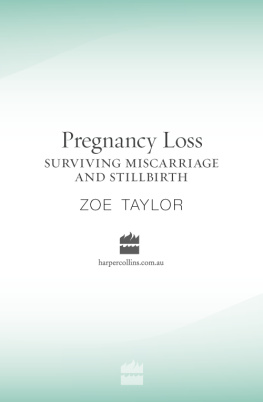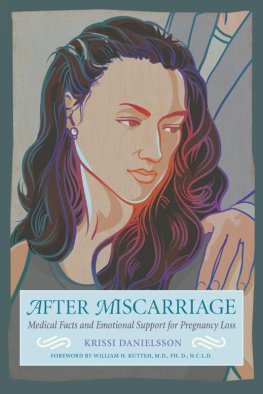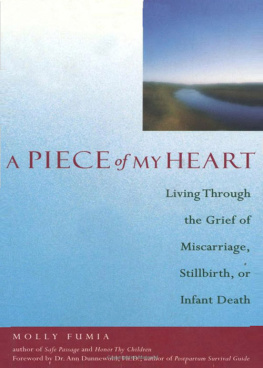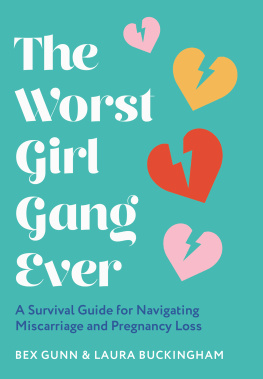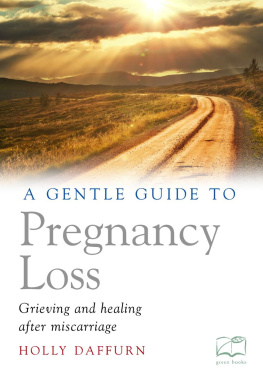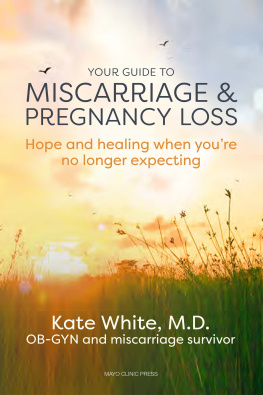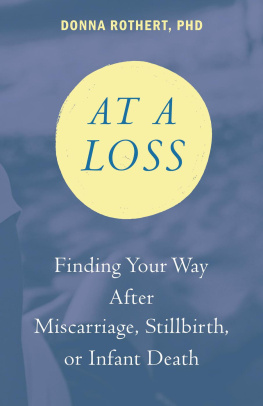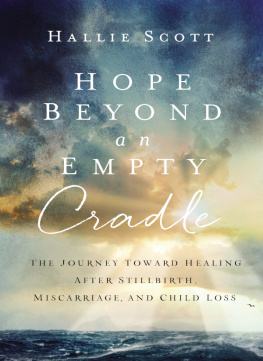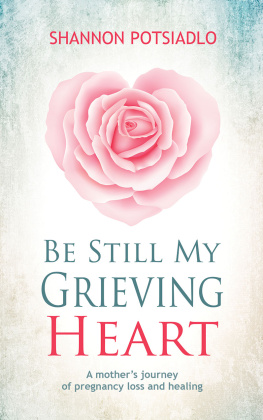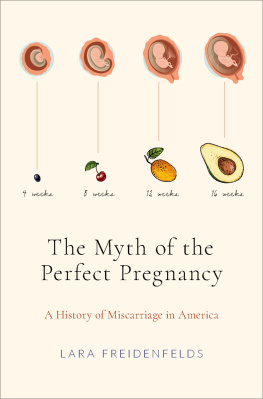Zoe Jay Taylor - Pregnancy loss: surviving miscarriage and stillbirth
Here you can read online Zoe Jay Taylor - Pregnancy loss: surviving miscarriage and stillbirth full text of the book (entire story) in english for free. Download pdf and epub, get meaning, cover and reviews about this ebook. City: Pymble;N.S.W, year: 2010, publisher: HarperCollins Publishers, genre: Religion. Description of the work, (preface) as well as reviews are available. Best literature library LitArk.com created for fans of good reading and offers a wide selection of genres:
Romance novel
Science fiction
Adventure
Detective
Science
History
Home and family
Prose
Art
Politics
Computer
Non-fiction
Religion
Business
Children
Humor
Choose a favorite category and find really read worthwhile books. Enjoy immersion in the world of imagination, feel the emotions of the characters or learn something new for yourself, make an fascinating discovery.
- Book:Pregnancy loss: surviving miscarriage and stillbirth
- Author:
- Publisher:HarperCollins Publishers
- Genre:
- Year:2010
- City:Pymble;N.S.W
- Rating:3 / 5
- Favourites:Add to favourites
- Your mark:
- 60
- 1
- 2
- 3
- 4
- 5
Pregnancy loss: surviving miscarriage and stillbirth: summary, description and annotation
We offer to read an annotation, description, summary or preface (depends on what the author of the book "Pregnancy loss: surviving miscarriage and stillbirth" wrote himself). If you haven't found the necessary information about the book — write in the comments, we will try to find it.
Pregnancy loss: surviving miscarriage and stillbirth — read online for free the complete book (whole text) full work
Below is the text of the book, divided by pages. System saving the place of the last page read, allows you to conveniently read the book "Pregnancy loss: surviving miscarriage and stillbirth" online for free, without having to search again every time where you left off. Put a bookmark, and you can go to the page where you finished reading at any time.
Font size:
Interval:
Bookmark:
For all our babies: the ones we get to kiss goodnight and the ones we keep in our hearts.
Due to the sensitive nature of the subject matter, this book contains material that may be disturbing to some readers.
While this book is intended as a general information resource and all care has been taken in compiling the contents, this book does not take account of individual circumstances and this book is not in any way a substitute for medical advice. It is essential that you always seek qualified medical advice if you suspect you have a health problem. The author and the publisher cannot be held responsible for any claim or action that may arise from reliance on the information contained in this book.
A percentage of the proceeds from the sale of this book will be donated to the Stillbirth Foundation Australia.
Stillbirth and miscarriageoften referred to as pregnancy lossare devastating experiences that take parents on a lonely journey. In Pregnancy Loss: Surviving Miscarriage and Stillbirth, author Zoe Taylor provides a truthful, factual and emotional account of that journey.
This book is remarkable, not only because it is written by someone who has experienced multiple pregnancy losses and can therefore offer great empathy, but it is meticulously researched. It provides, for the first time, an accurate and comprehensive picture of what it means to lose a baby. Zo Taylor describes this book as a collection of voices and unique perspectives, which is very true. It includes interviews from health professionals and leading researchers from across the globe, references to published medical research, and quotations from numerous real families whose baby has died.
The death of a baby raises question after questionmany beginning with the words why? and how? So often there are no answers. This book, with its encyclopaedic facts and real stories, provides a clear framework for the reader who wishes to understand all they can. It highlights what is known and what is still being explored. And while no book can answer every question about pregnancy loss, this is an exceptionially informative read.
For anyone who wishes to understand the emotional side of pregnancy loss, Pregnancy Loss: Surviving Miscarriage and Stillbirth is in a league of its own. It gives a clear and unflinching account of what it really means to continue living following the death of a baby. It is a book of amazing insights.
For those who have lived through the death of their baby, this book will provide comfort, answer many of your questions, and go a long way to normalising your feelings.
For family and friends of anyone whose baby has died, this book will provide some understanding and suggestions for helping and supporting your loved one.
For health professionals who work with families whose baby dies, this book provides a glimpse into the excruciating experience of pregnancy loss. I know that reading this will allow you to see more clearly the massive wrench such loss causes.
I wholeheartedly and confidently recommend Pregnancy Loss: Surviving Miscarriage and Stillbirth as an essential read: inevitably, pregnancy loss will affect every person, either directly or indirectly, at some stage in their life. And while today we still dont know enough about why babies die, this book provides understanding, clarity and hope.
Emma K McLeod
Founder, Stillbirth Foundation Australia
How do you find ways to describe what its like when a baby dies during pregnancy? Sometimes even the most carefully chosen words are not enough. Try devastation, incomprehension, gut-wrenching sadness. There might be feelings of failure, anger and frustration. There can be disbelief, denial and sheer horror. Then the struggle begins to try to understand how this could possibly have taken place. Why did it happen to you? Was it your fault? How can you make sense of it?
The chances are that before you experienced it yourself, you had never spoken in detail to someone who had gone through pregnancy loss and had never dared to contemplate that it might happen to you. Without realising it, almost certainly you will have rubbed shoulders with people who have suffered a loss; its just that they never confided in you.
Thumb through any pregnancy book and you might find a page on miscarriage, usually detailing the warning signs. Stillbirth rarely even rates a mention. Mother and baby magazines offer a huge amount of advicefrom what to pack in your hospital bag, to nursery design and labour plans. But few have the courage to tackle the reality that not all pregnancies are successful. Antenatal classes, by their very nature, are about trying to help prospective parents understand great unknowns, but there appears to be a reluctance to consider unhappy endings.
These are some of the reasons why pregnancy loss often takes you to a very lonely place. As you begin the often fruitless search for answers, logic and sense, it can feel as if nobody can fully understand your painnot even your partner. You might despair and feel that very few people will have any idea what it is like to walk in your shoes. And while you may wish that nobody else should ever go through a similar experience, you might also crave the comfort that comes from knowing you are not entirely alone.
The reality is that pregnancy loss is much more common than many people imagine. One in four women experience pregnancy loss of some kind. A large proportion of pregnanciesabout six out of 10are lost without the women even realising they have conceived. A further 10 to 15 per cent will fail later during the pregnancy. While the chances of a pregnancy failing fall to only about 2 per cent after the first trimester, the number of babies being stillborn is surprisingly high: about seven in every 1000 babies.
Every day, about six babies will be stillborn in Australia and New Zealand, and there are about 55,000 miscarriages every year in Australia. Survival rates of babies during their first 28 days of life have vastly improved, and miracle babies who survive despite being born sometimes little over halfway through a pregnancy are regularly celebrated in the media.
What tends to compound the grief of parents struggling to come to terms with the death of an unborn baby is that while pregnancy loss is not unusual, it is poorly understood. Medical professionals are frequently unable to offer an explanation, and friends and family are at a loss as to what to say. All too often this results in even more loneliness, frustration and desperation.
But there are invisible ties that bond those who have been personally touched by pregnancy lossa simple sorry from someone who can truly imagine your pain can mean so much. And couples do find comfort in unexpected places. Also, there is some real momentum towards educating the public about pregnancy loss and lobbying for more research into its causes. I hope Pregnancy Loss: Surviving Miscarriage and Stillbirth will contribute to that.
There are taboos around pregnancy loss that we need to break down. While researching this book, it became clear to me that the generation of women who are now grandmothers were often expected to cope with miscarriage and stillbirth with little support. Failed pregnancies were not discussed. In fact, it was quite common for women who experienced pregnancy loss to find out years later that something similar had happened to a relativeeven their own motherbut it had never been mentioned.
This is by no means to suggest that women were left untouched by these tragediesquite the contrary. I have encountered women who are still struggling with their feelings decades later, but have been unable to voice their emotions.
To borrow the words of mother and writer Jayne Kearny, parents who have lost a baby during pregnancy become members of a club. It is a club we wish we did not belong to. It can be a secretive club, and there are times when we have no idea how we should behave, either alone or with other members. One woman explained to me how she is able to identify other members of the club, without having toaskonce she admits to being a member she can simply see it in their faces. Words are not always necessary.
Font size:
Interval:
Bookmark:
Similar books «Pregnancy loss: surviving miscarriage and stillbirth»
Look at similar books to Pregnancy loss: surviving miscarriage and stillbirth. We have selected literature similar in name and meaning in the hope of providing readers with more options to find new, interesting, not yet read works.
Discussion, reviews of the book Pregnancy loss: surviving miscarriage and stillbirth and just readers' own opinions. Leave your comments, write what you think about the work, its meaning or the main characters. Specify what exactly you liked and what you didn't like, and why you think so.

